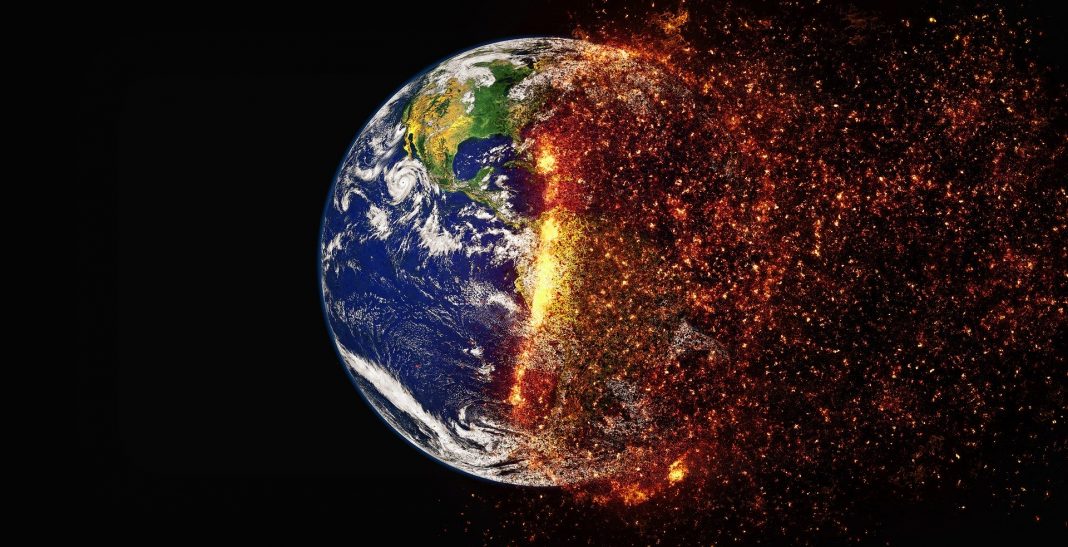Bright-eyed and hunched back, Bernie Sanders, one of the many democratic presidential candidates still in the race, proceeds through the crowd of people as Back in Black by AC/DC plays in the background. He is followed closely by two cameramen documenting his every move as waves and offers high fives to his passionate supporters.
As he walks on stage and embraces Alexandria Ocasio-Cortez, U.S. Representative for New York’s 14th Congressional District , the crowd exploded with chants of support on this relatively cool October afternoon. Sanders stands on a stage behind a dark tinted wooden podium overlooking an ocean of concerned citizens.
Alexandria Ocasio-Cortez is in New York to promote Sanders’ presidential campaign and to advocate their joint “Green New Deal” proposal. This proposal aims to use the power of the federal government to push the United States away from fossil fuels, decrease national greenhouse gas emissions and promote cleaner sources of energy.
“One of the proposals I have introduced during this campaign is the most comprehensive climate change plan ever introduced by any candidate running for federal office,” says Sanders. “In other words, we are listening to the scientists. our legislation will hold the fossil-fuel industry accountable. It will create up to 20 million new jobs as we transform our energy system away from fossil fuel, to energy sufficiency and sustainable energy. It will give us the tools that we need to help lead the world in combating climate change, and save this planet for our children and future generations.”
Based on data collected by the National Oceanic and Atmospheric Administration (NOAA) in their 2018 Global Climate Summary, the combined land and ocean temperature has increased at an average rate of 0.13°F per decade since 1880. However, since the 1980s, the average rate has increased exponentially to 0.31°F . This sharp rise in global temperature not only has negative implications on the present, in the form of melting glaciers, rising sea levels, and severe heat waves, but it also has negative consequences for our future .
For example, climate change can have negative implications for our mental health . Jennifer Atkinson, a climate depression educator, and professor at the University of Washington, has found that the continued presence of climate change has caused people to experience anxiety and depression .
“The general definition is simply distress about the state of our natural world: climate change, mass extinction, toxic pollution, extreme weather, all the bad news we encounter in the media and increasingly experience in our daily lives,” says Atkinson. According to Atkinson, there is substantial evidence justifying a connection between extreme environmental disasters and long-term psychological effects like chronic depression, PTSD and anxiety.
“This is really heavy stuff to deal with at any age. But for young people especially, they’re just starting off their lives, they’re supposed to be looking forward to the future: to growing up, gaining independence, pursuing their dreams. And instead, they’re looking at a potentially very difficult future where the quality of life is diminished by climate disruption and other forms of environmental loss.”
In Atkinson’s conversations with students and professors about climate change, she noticed that there was an overwhelming pessimism surrounding the future of the environment. “For years I’ve seen students walking around with dark clouds over their heads. Feeling depressed over political inaction, grief for mass extinction & the loss of wildlife, anxiety about the future — and anger & betrayal at the inaction of an older generation.”
Over 20,000 people attended the Sanders rally this past October, which exemplifies the importance of the issue in contemporary politics and demonstrates how genuinely concerned people are about climate change . This apparent unease and worry surrounding the issue of climate change and environmental deterioration may impact the way in which Americans vote in the upcoming 2020 presidential election.
When the Yale Program on Climate Change Communication(YPCCC) surveyed voters in Iowa and they found that 69% of registered voters say they are worried about climate change and 77% of Iowan voters that they are more likely to vote for a candidate who promotes the use of renewable energy.
“Historically, presidents have implemented varying forms of regulatory or deregulatory environmental policy,” says Christopher Borick, a political science professor at Muhlenberg. “Depending on their policy initiative, presidents may choose to prioritize other issues or they just may choose not to strictly enforce environmental policy.”
“Fluctuation within the executive branch leads to a sort of environmental seesaw,” says Borick. “However, while many voters believe that environmental issues need to be addressed, they are not necessarily willing to prioritize environmental protection over other issues like immigration or the economy.”
As climate change has hastened, the issue has become more important in the United States because the consequences are more visible and impact a greater amount of American citizens. A 2019 Pew Research Center survey comparing opinions on the environment from 2009 to 2019 found that more Americans today say protecting the environment and dealing with global climate change should be top priorities for the president and Congress. A majority of U.S. adults (56%) say protecting the environment should be a top priority for the president and Congress, while a smaller share (44%) says the same about dealing with global climate change, according to a 2019 Pew Research Center survey.
According to Borick, there are significant differences between how older generations view climate change and how younger generations view climate change . In another Pew Research Center survey, they examined how education, gender, and age are related to evaluations of climate change as a threat. They found that in the U.S., 71% of Americans between the ages of 18 to 29 say climate change is a threat, while 50% of Americans 50 and older viewed climate change as a threat. “It’s an important issue. Climate change has been around for a while. There is a new level of engagement, especially amongst the younger generations,” says Borick. “It’s is more relevant to electoral choice than it has been in any other election.”

























